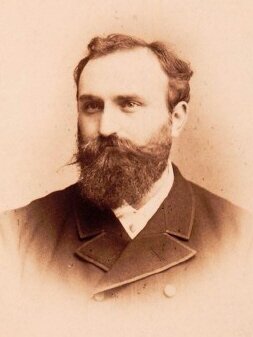The Auburn Symphony takes its friendly tone from its conductor and founder Stewart Kershaw, who gives the preconcert lectures, often in a discussion with orchestra cellist and KUOW-FM radio host Dave Beck, and also gives a brief introduction of the concert works to the audience from the podium.

Saturday night was a case in point. Beck and Kershaw between them gave us a thumbnail sketch of 19th-century composer Ernest Chausson, with slides, and it was clear that the composer holds a place of great affection in Kershaw’s pantheon. Chausson composed only three big works, which aren’t that often played, and Kershaw has programmed them all for Auburn, the Symphony in B Flat being last Saturday’s contribution.
I’m not sure that I agree with Kershaw of the importance of Chausson, who died at 44, but Kershaw led the orchestra in a performance luminous with the work’s meaning and subtleties, with details which might have bypassed someone less enthusiastic.
Somewhat earlier in the century, composer Hector Berlioz (a man of often unsuitable passions) became fascinated by the idea of the noble pirate, and wrote his ideas into the overture, The Corsair. He’s a composer whose musical idiom is so singular that it takes only a measure or two of any of his music to identify him as having written it. Corsair is typical. It’s a lively piece, full of color and vitality, and as usual, the excellent ASO gave it a fine, crisp, musical performance.
It is worth noting that there were at least two teenagers on stage. Kershaw has always encouraged talented local kids and given them the opportunity to experience playing in a professional orchestra. Without there being any fanfare about them, cellist Justin Kim and trumpeter Natalie Dungey performed with the orchestra Saturday night.
The final work, truly a Valentine, came from the pen of Franz Liszt, the 19th-century pianist who could play like an angel and was perhaps the first classical musician to gather swarms of adoring fans around him, fainting and grabbing bits of his clothing.
Craig Sheppard was the soloist in the Piano Concerto No. 2. Any Liszt work has an extroardinary number of notes, and though Sheppard dropped a few, he played with plenty of energy where it was due, and with beautiful smooth soft passages rich with expression and melody, or dreamy and musing. You could call it a work of romance personified, and the two Liszt encores he played after reinforced the impression.
The piano itself left something to be desired in its topmost and bottommost note ranges. Here the rich tone quality of the rest of the instrument became noticeably flattened out with little reverberance. Perhaps a local benefactor could contribute the use of a really good piano next time around.